#41 - Marbles Puzzle
There is a box full of marbles,
all but two are blue,
all but two are green,
and all but two are red.
How many marbles are in the box ?
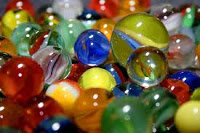
There are 3 marbles (1 blue, 1 green, and 1 red).
There is a box full of marbles,
all but two are blue,
all but two are green,
and all but two are red.
How many marbles are in the box ?

There are 3 marbles (1 blue, 1 green, and 1 red).
Lavesh, Bolt, and Lewis race each other in a 100 meters race. All of them run at a constant speed throughout the race.
Lavesh beats Bolt by 20 meters.
Bolt beats Lewis by 20 meters.
How many meters does Lavesh beat Lewis by ?
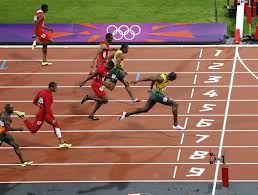
Lavesh beats Lewis by 36 meters.
It is tempting to guess that Lavesh beats Lewis by 40 meters, but when Lavesh finishes and is 20 meters ahead of Bolt, Bolt is NOT 20 meters ahead of Lewis (he's only 16 meters ahead), and it will take a couple more seconds before Bolt increases his lead over Lewis to 20 meters.
To figure out the answer, we let Lavesh's speed be A meter/second. So it takes him 100/A seconds to finish the race. At this point, we know that Bolt has run 80 meters (since Lavesh beats him by 20 meters). So Bolt runs 80 meters in 100/A seconds, meaning that he is running at a speed of (80/(100/A)) meters/second, or (8A/10) meters per second.
So we then know that it takes Bolt 100/(8A/10) seconds to finish the race, or 125/A seconds. At this point, we know that Lewis has run 80 meters (since Bolt beats him by 20 meters). So Lewis runs 80 meters in 125/A seconds, meaning that he is running at a speed of (80/(125/A)) meters/second, or 80A/125 meters per second.
Now that we know Lewis's speed, we just need to figure out how far he had run when Lavesh finished the race. Since Lavesh finished in 100/A seconds, we can determine that Lewis had run (100/A) * (80A/125) = 8000/125 = 64 meters when Lavesh finished the race. And so Lavesh beat him by (100 - 64) = 36 meters.
3 kids Prinka Tanu and Vidushi got some chocolates.
Prinka gave Tanu and Vidushi as many chocolates as they already had.
Then Tanu gave Prinka and Vidushi as many chocolates as they already had.
Finally, Vidushi gave Tanu and Prinka as many chocolates as they already had.
Now each of them has 24 chocolates.
How many chocolates they had originally?
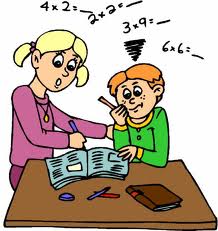
Prinka had 39 , tanu had 21 and vidushi had 12 chocolates initially.
Solve the problem in reverse way as below :
Prinka Tanu Vidushi
24 24 24
12 12 48
6 42 24
39 21 12
Manish drive to his office at 20km/hr. After reaching office, he realize that today is a holiday of 'Labor Day'.He went back at average speed of 30km/hr. Discounting the time spent in the stoppage what was his average speed of his journey ?

24km/hr (not 25km/hr which might be guessed by many)
D : distance traveled
T1 : time of going to office
T2 : time of returning back
Y : Average Speed
D = 20 * T1
T1 = D/20
D = 30 * T2
T2 = D/30
2D = Y(T2 + T1)
2D = Y(D/20 + D/30)
2D = Y(3D/60 + 2D/60)
2D = Y(5D/60)
Y = 120D/5D
=> Y = 24
I have a role of cloth 1km long.
I have a machine which cuts this role into pieces of 10 meter long cloth.
How long would it take for the machine to cut the roll if each cut took 4 secs ?
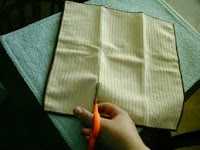
396 seconds
1000m would only take 99 cuts not 100.
so 4*99 => 396
According to number theory of mathematics , a perfect number is a positive integer that is equal to the sum of its positive divisors excluding the number itself.
For example :
6 => 1+2+3
28 =>1+2+4+7+14
I know one more number that is a perfect number and contains not more than 2 digits (i.e 496 won't be consider as it contains 3 digits).
Find the number ?
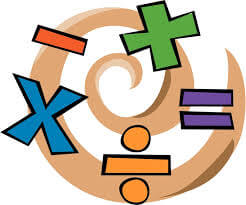
12=> 1+2+3+6
cannot be 1 (as number cannot be included)
Can you convert number zero(0) into a positive number using just one mathematical operator ?
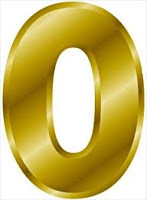
0!
Find the value of a by solving the maths equation in the picture below
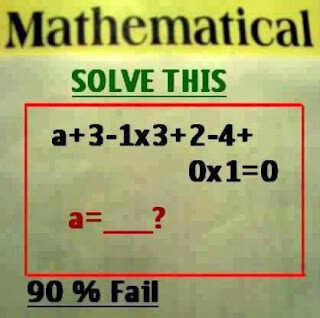
2(remember bodmas)
A women walks into a bank to cash out her check.
By mistake the bank teller gives her rupee amount in change, and her paise amount in rupees.
On the way home she spends 5 paise, and then suddenly she notices that she has twice the amount of her check.
How much was her check amount ?
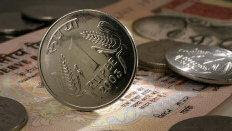
The check was for Rupees 31.63.
The bank teller gave her Rupees 63.31
She spent .05, and then she had Rupees 63.26, which is twice the check.
Let x be the rupees of the check, and y be the paise.
The check was for 100x + y paise
He was given 100y + x paise
Also
100y + x - 5 = 2(100x + y)
Expanding this out and rearranging, we find:
98y = 199x + 5
or 199x ≡ -5 (mod 98)
or 98*2*x + 3x ≡ -5 (mod 98)
3x ≡ -5 ≡ 93 (mod 98)
this quickly leads to x = 31